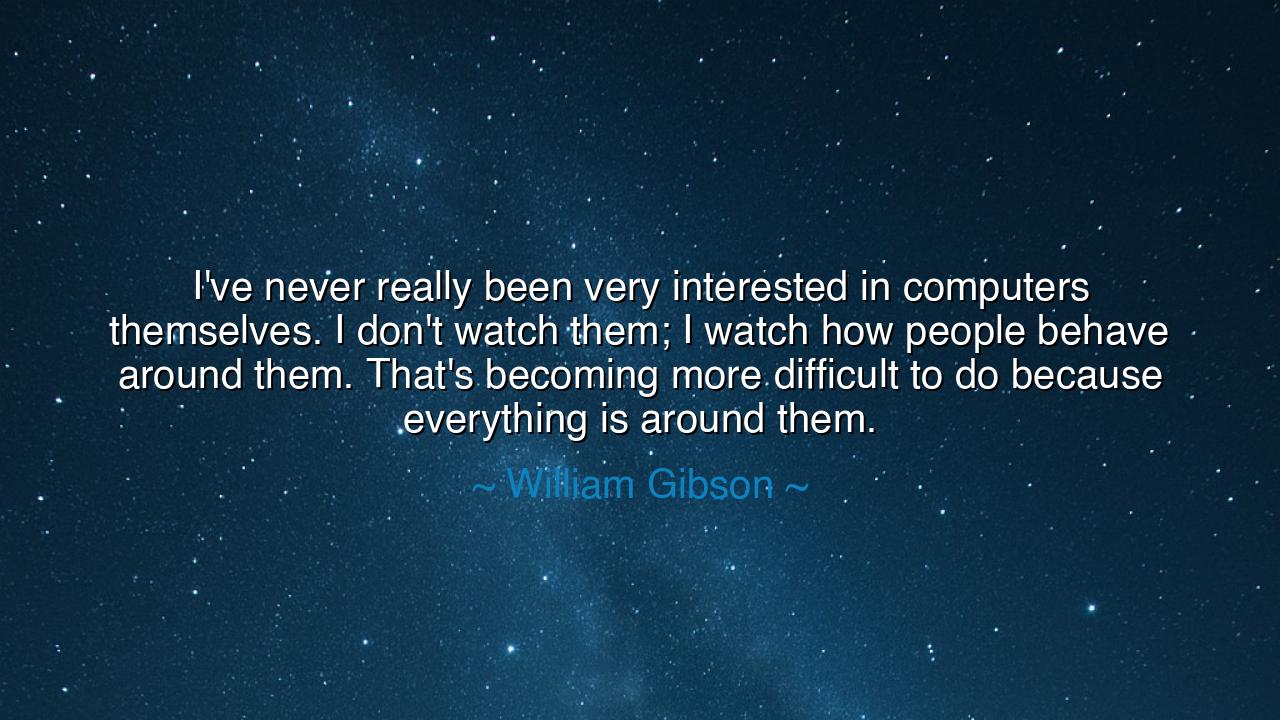
I've never really been very interested in computers themselves. I
I've never really been very interested in computers themselves. I don't watch them; I watch how people behave around them. That's becoming more difficult to do because everything is around them.






In an age when machines hum like gods and the glow of the screen illuminates every face, the visionary William Gibson, prophet of the digital dawn, spoke these words of quiet insight: “I've never really been very interested in computers themselves. I don't watch them; I watch how people behave around them. That's becoming more difficult to do because everything is around them.” In these lines lies a wisdom deeper than technology — the wisdom of seeing beyond the object into the soul of its user. Gibson, the author who first gave us the word “cyberspace”, understood that the story of the computer was not about circuits or code, but about humanity itself — how we would change as our creations began to shape us in return.
The origin of this quote comes from a man who foresaw the world we now inhabit — a world woven by invisible networks, where every life is entangled with the digital web. Long before the Internet became the pulse of civilization, Gibson envisioned it in his novel Neuromancer — a vision of a vast, glowing space where data and desire collided. But even as he imagined this future, he remained more fascinated by the human spirit than by the machines themselves. To him, the true story was not in the cold precision of processors, but in the warmth, fear, and longing of the people who gathered around them — worshippers before a new kind of altar.
When Gibson says, “I don’t watch them; I watch how people behave around them,” he speaks as a sage and observer of culture, not a technician. He reminds us that the power of technology lies not in the tool, but in its effect upon the human heart and mind. The computer, in his eyes, is not a neutral object — it is a mirror. Around it, people reveal their dreams and their dependencies, their hunger for connection and their fear of isolation. And as he observes, this act of watching becomes ever harder, for “everything is around them.” The world has become so saturated by screens that there is no longer an outside vantage point; the observer and the observed are both within the machine.
There is an echo of ancient wisdom in Gibson’s lament. Consider the tale of Narcissus, who gazed into his reflection and fell in love with the image, forgetting himself. So too do we, in our digital age, gaze into the mirror of our devices and mistake the reflection for reality. Gibson’s warning is not one of fear, but of awareness: that as technology wraps itself around us, we risk losing the clarity to see how it changes us. Just as the fisherman becomes part of his net, so humanity risks being caught within the web it has spun. What began as a tool for liberation can become, without mindfulness, a prison of the spirit.
Yet, Gibson’s insight also carries hope — the reminder that to watch human behavior is to remain awake to our own transformation. Even in an age of artificial intelligence and digital illusion, there is still the possibility of self-awareness, of reflection upon how we live, love, and learn through our machines. He urges us to be students not of the device, but of the dance between human and technology. For the danger is not that we will build thinking machines, but that we will forget how to think deeply ourselves.
One might recall the story of Socrates, who warned the Athenians that the written word — the very invention of writing — would weaken human memory and wisdom. And yet, writing became one of humanity’s greatest gifts. So it is with computers: they amplify both our brilliance and our blindness. Gibson’s wisdom lies in calling us to balance — to use these tools while never surrendering to them. To watch ourselves, as he does, is the act of a philosopher, a guardian of consciousness in an era of automation.
So, O listener of the modern world, take this teaching as your compass: do not be consumed by the machine; observe your own reflection within it. When you reach for your phone, when you scroll the endless feed, pause and ask — what am I seeking here? Connection, comfort, distraction, or meaning? Remember that technology reveals not what it is, but who we are. Gibson’s words remind us that wisdom does not come from learning how machines think, but from remembering how humans feel.
The lesson of William Gibson’s insight is this: that even in a world ruled by code, the human story remains the true narrative. The machines may surround us, but they cannot define us — unless we let them. Therefore, live as the ancients would in this age of light and metal: with awareness, discernment, and reverence for the mystery of being human. Watch not the screen, but the soul reflected in it. For though everything is around the computer, the heart — still beating, still yearning — must remain beyond its grasp.






AAdministratorAdministrator
Welcome, honored guests. Please leave a comment, we will respond soon